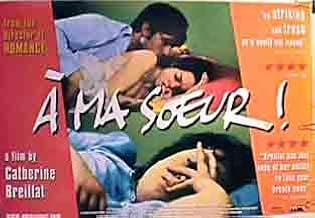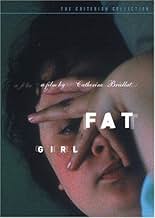CALIFICACIÓN DE IMDb
6.4/10
13 k
TU CALIFICACIÓN
Dos hermanas confrontan sus actitudes y experiencias sexuales durante unas vacaciones familiares.Dos hermanas confrontan sus actitudes y experiencias sexuales durante unas vacaciones familiares.Dos hermanas confrontan sus actitudes y experiencias sexuales durante unas vacaciones familiares.
- Dirección
- Guionista
- Elenco
- Premios
- 4 premios ganados y 3 nominaciones en total
Claude Sésé
- Police Officer
- (as Claude Sese)
- Dirección
- Guionista
- Todo el elenco y el equipo
- Producción, taquilla y más en IMDbPro
Opiniones destacadas
Directed by the 'controversial' Catherine Breillat (she showed a hard-on in her last movie, 'Romance'), the story revolves around a family on holiday with two adolescent sisters, the chubby 13 year old Anaïs (played by Anaïs Reboux) and the rather more svelte Elena (Roxane Mesquida) who is two years her senior, although rather less mature. Both girls are still virgins, although Elena is clearly aware of the power of her beauty over the opposite sex. Effortlessly she pulls Italian law student Fernando (Libero De Rienzo, with whom she begins an intense relationship. Fernando talks of love, but is obviously keen for sex. Poor Anaïs is unfortunately sharing a room with the pair as they fumble towards a deflowering. Indeed, this is one of the most beguiling scenes in the movie; you feel awkward bearing witness to what is going on - the constant demands of Fernando for 'a demonstration of love', which after refusals brings forth the sorts of coercing phrases regarding anal sex that so many girls must dread to hear.
The animosity is often intense between the sisters, Anaïs' bitterness towards her sister combined with a resigned maturity that only rejection and frustration can breed. But at the same time there are wonderful scenes of the two sharing sisterly moments; albeit with bile never far away. The point is well made, the bond is there, no matter how much of a bitch Elena can be. Anaïs is such a lost, sad character; the melancholic beauty of one scene on the beach where she is singing to herself whilst Elena and Fernando 'make out' is incredible. Also well portrayed is the relationship with the parents. Mother is very much like Elena; Father is a workaholic who hates holidays and returns home before the others. Although the parents are mostly secondary in the story, you sense that they tend to reinforce Anaïs insecurities and knock her down further. This is exemplified in the scene the morning after the first Elena & Fernando night together. Anaïs is clearly really low, crying and choked. Her parents offer zero warmth, the only solace coming from a still caustic Elena shoving bread into her mouth to comfort her.
The story climaxes as the sisters and their mother return home from their holiday, after a gloriously comic scene where Fernando's mother (Laura Betti) visits to reclaim a precious ring that he had given to Elena as an engagement ring. The journey toward home is fantastically shot; the claustrophobia of motorway driving - especially since the mother doesn't like driving, and is pretty p****d at Elena's antics and Anaïs' miserableness - metaphoring the unease between the three, even more so as night wears on and mother becomes more wary of the huge dangerous lorries that she overtakes incautiously on the freeway. If I was an absolute ponce (or totally fearless), I would say these trucks are a metaphor for the male predatory sexuality against the tiny feminine car (which still manages to nimbly overtake at will most of the time). But I'm not (?), so I won't. Anyway, the ending comes as a huge shock. So I'm not going to tell you it. But safe to say you don't leave the cinema with a laugh and a giggle.
Overall, I was actually surprised by how deep this story was; there was only one gratuitous erection, and even that was covered by a condom. A brave attempt to analyse adolescent female sexuality, often leaving an unplesant taste in the mouth, but well worth a go if you're in the mood.
The animosity is often intense between the sisters, Anaïs' bitterness towards her sister combined with a resigned maturity that only rejection and frustration can breed. But at the same time there are wonderful scenes of the two sharing sisterly moments; albeit with bile never far away. The point is well made, the bond is there, no matter how much of a bitch Elena can be. Anaïs is such a lost, sad character; the melancholic beauty of one scene on the beach where she is singing to herself whilst Elena and Fernando 'make out' is incredible. Also well portrayed is the relationship with the parents. Mother is very much like Elena; Father is a workaholic who hates holidays and returns home before the others. Although the parents are mostly secondary in the story, you sense that they tend to reinforce Anaïs insecurities and knock her down further. This is exemplified in the scene the morning after the first Elena & Fernando night together. Anaïs is clearly really low, crying and choked. Her parents offer zero warmth, the only solace coming from a still caustic Elena shoving bread into her mouth to comfort her.
The story climaxes as the sisters and their mother return home from their holiday, after a gloriously comic scene where Fernando's mother (Laura Betti) visits to reclaim a precious ring that he had given to Elena as an engagement ring. The journey toward home is fantastically shot; the claustrophobia of motorway driving - especially since the mother doesn't like driving, and is pretty p****d at Elena's antics and Anaïs' miserableness - metaphoring the unease between the three, even more so as night wears on and mother becomes more wary of the huge dangerous lorries that she overtakes incautiously on the freeway. If I was an absolute ponce (or totally fearless), I would say these trucks are a metaphor for the male predatory sexuality against the tiny feminine car (which still manages to nimbly overtake at will most of the time). But I'm not (?), so I won't. Anyway, the ending comes as a huge shock. So I'm not going to tell you it. But safe to say you don't leave the cinema with a laugh and a giggle.
Overall, I was actually surprised by how deep this story was; there was only one gratuitous erection, and even that was covered by a condom. A brave attempt to analyse adolescent female sexuality, often leaving an unplesant taste in the mouth, but well worth a go if you're in the mood.
Brelliat drives me a little crazy. She is an observer of one small corner of life and seems incidentally a filmmaker. You get different editions of her observations on the distance of young sex across which we throw ropes.
So the question is which is the best and whether each one that follows adds something new, worthwhile.
The best to my mind was "A Real Young Girl" of thirty years ago. It had an honesty that everything subsequently lacks. By this I mean you could feel the filmmaker's emotions quite apart from whatever was happening on screen.
What we have here are two scenes. The first is hugely promising: a pretty girl loses her virginity while witnessed by her much younger sister. Drawn out circling of the boy. Set up in a way that we share in the discomfort as witness and some of the charm of the situation. We are seducer, voyeur, victim.
Brelliat knew this well enough to build a whole different movie about the nature of this voyeurism, "Sex is Comedy." You need to see the two together to get the folding.
The problem with Brelliat is that she has these emotional insights and she can pose scenes. But she has no skill at all in seeing the larger shape of the narrative. She doesn't understand the long form and the structure of a story. Lacking this, we get only scenes, and here we have only two. The second one is brutal, as if the first demanded the second.
The only thing to recommend this is the effect you get from watching the first scene. You quickly realize that because you are watching, you are part of the damage she sketches.
Ted's Evaluation -- 2 of 3: Has some interesting elements.
So the question is which is the best and whether each one that follows adds something new, worthwhile.
The best to my mind was "A Real Young Girl" of thirty years ago. It had an honesty that everything subsequently lacks. By this I mean you could feel the filmmaker's emotions quite apart from whatever was happening on screen.
What we have here are two scenes. The first is hugely promising: a pretty girl loses her virginity while witnessed by her much younger sister. Drawn out circling of the boy. Set up in a way that we share in the discomfort as witness and some of the charm of the situation. We are seducer, voyeur, victim.
Brelliat knew this well enough to build a whole different movie about the nature of this voyeurism, "Sex is Comedy." You need to see the two together to get the folding.
The problem with Brelliat is that she has these emotional insights and she can pose scenes. But she has no skill at all in seeing the larger shape of the narrative. She doesn't understand the long form and the structure of a story. Lacking this, we get only scenes, and here we have only two. The second one is brutal, as if the first demanded the second.
The only thing to recommend this is the effect you get from watching the first scene. You quickly realize that because you are watching, you are part of the damage she sketches.
Ted's Evaluation -- 2 of 3: Has some interesting elements.
This is a film that is difficult to say you "liked." It gives a view of the different facets of cruelty. Anais (the "Fat Girl" of the title) is buffeted with cruelty and indifference at every turn--that directed toward her and that she witnesses. Her corpulence is both an attempt to insulate herself against these assaults but at the same time, indicative of her internalization of them. But ultimately, the film is similarly an assault on the viewer, be warned. It stings.
At the NY Film Festival's Q&A with Breillat, she expressly forbid seeing "Fat Girl" (as she prefers to call it) as a morality play. She eluded any attempts to draw her into conclusions about her film, insisting that she is not a moralist.
What is clear from the questions she asks, however, is that she views sex with a certain contempt, especially as regards the male role in the act. The men that are in the film are either insensitive, duplicitous or murderous. Breillat's intent is to show how adrift any adolescent girl is when it comes to sexuality and to somehow convey that to an adult audience. She counseled young Anais during filming by saying, "We are making a film that I don't even think you can see when it is done, but it is not for you. It is supposed to scare adults."
What is clear from the questions she asks, however, is that she views sex with a certain contempt, especially as regards the male role in the act. The men that are in the film are either insensitive, duplicitous or murderous. Breillat's intent is to show how adrift any adolescent girl is when it comes to sexuality and to somehow convey that to an adult audience. She counseled young Anais during filming by saying, "We are making a film that I don't even think you can see when it is done, but it is not for you. It is supposed to scare adults."
Somehow this film picked up the English title 'A Fat Girl'. How inappropriate, I thought, because for most of the film, the romance of the elder, more attractive sister takes center-stage. It is only at the end, after some horrible things have happened, that it becomes clear that the film has been leading us to understand the fat sister Anais's strange reaction to what happened to her. I have read criticism of the violence late in the film, as not having flowed out of what has gone before. Such criticism misses the point of the movie, I think, which is about the contrast between Anais's first sexual experience and the lovely Elena's, and Anais's acceptance of rape as being preferable to being in love with the boy, as Elena had been, when we and Anais watched Elena's first intercourse.
I thought the acting in this film wonderful, and Anais Reboux, as the fat girl is an outstanding find. This is a touching film, with real characters with whom to empathize, especially the two girls, both young and romantic, one with a saving touch of cynicism.
I thought the acting in this film wonderful, and Anais Reboux, as the fat girl is an outstanding find. This is a touching film, with real characters with whom to empathize, especially the two girls, both young and romantic, one with a saving touch of cynicism.
¿Sabías que…?
- TriviaA man was arrested by Canada Customs and Revenue Agency in July of 2003 for importing a copy into Canada, on the grounds that the movie constituted obscene material.
- ErroresTodas las entradas contienen spoilers
- Citas
Anaïs Pingot: When I hate you, I look at you and then I can't.
- Versiones alternativasWhen released on home video in the UK, this title was cut by 1 minute and 28 seconds to cut down a scene of sexual assault. Ireland banned it altogether.
- Bandas sonorasSocial Climber
Performed by Laura Betti
Selecciones populares
Inicia sesión para calificar y agrega a la lista de videos para obtener recomendaciones personalizadas
- How long is Fat Girl?Con tecnología de Alexa
Detalles
- Fecha de lanzamiento
- Países de origen
- Sitios oficiales
- Idiomas
- También se conoce como
- Fat Girl
- Locaciones de filmación
- Productoras
- Ver más créditos de la compañía en IMDbPro
Taquilla
- Total en EE. UU. y Canadá
- USD 725,854
- Fin de semana de estreno en EE. UU. y Canadá
- USD 31,237
- 14 oct 2001
- Total a nivel mundial
- USD 765,705
- Tiempo de ejecución1 hora 35 minutos
- Color
- Mezcla de sonido
- Relación de aspecto
- 1.85 : 1
Contribuir a esta página
Sugiere una edición o agrega el contenido que falta

Principales brechas de datos
What is the French language plot outline for Mi hermana virgen (2001)?
Responda
![Bande-annonce [OV]](https://m.media-amazon.com/images/M/MV5BNTU0ZWE0ODAtMGUwMS00NWRhLTg1NjUtMTFlNTYxOWFiMzhlXkEyXkFqcGdeQXRyYW5zY29kZS13b3JrZmxvdw@@._V1_QL75_UX500_CR0)





























